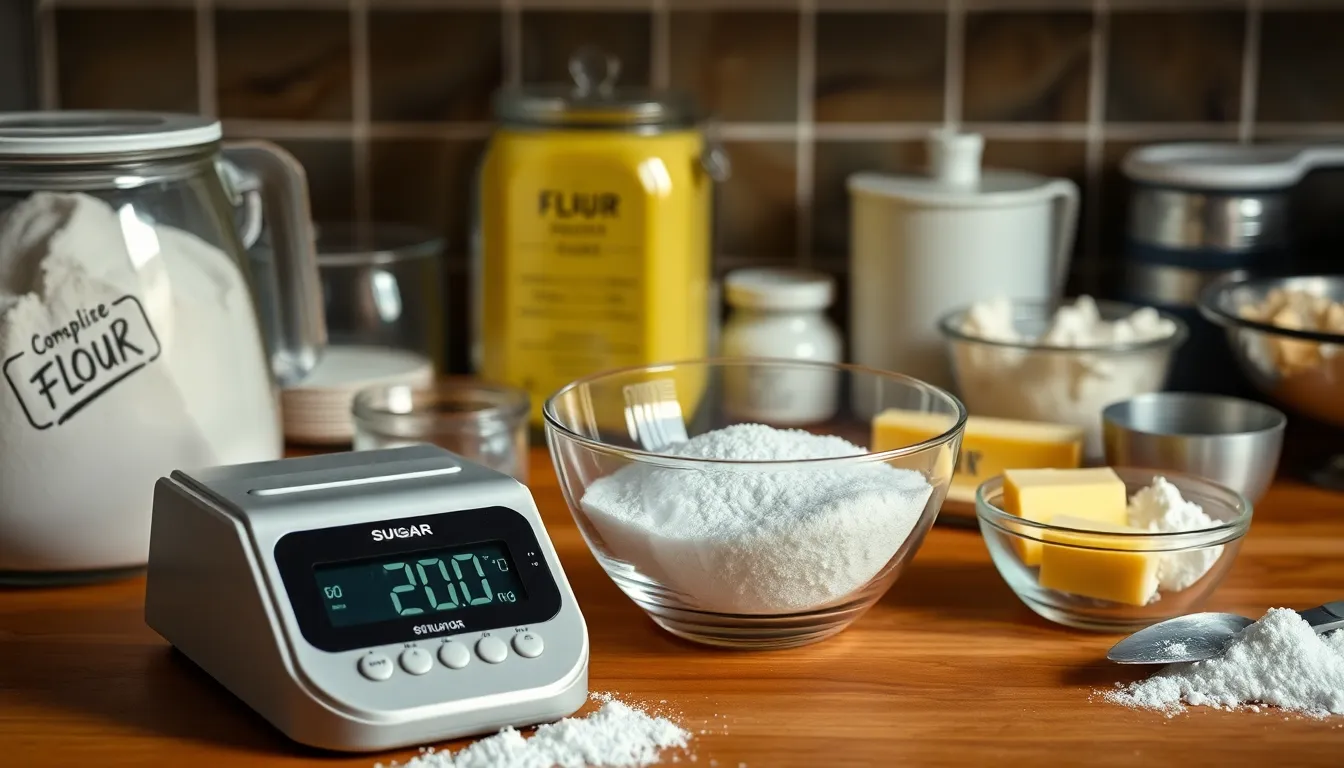When it comes to baking or cooking, precise measurements can make all the difference. One common question that arises is how much sugar is in a cup when measured in grams. Understanding this conversion is essential for achieving the perfect texture and flavor in recipes.
Sugar isn’t just a sweetener; it plays a vital role in the chemistry of baking. Whether someone is whipping up a cake or preparing a batch of cookies, knowing that 1 cup of granulated sugar equals approximately 200 grams can streamline the cooking process. This simple conversion can save time and ensure delicious results every time.
Table of Contents
ToggleUnderstanding Cup Measurements
Cup measurements play a vital role in cooking and baking, influencing the outcome of recipes. Different ingredients vary in weight, making accurate conversions essential. For granulated sugar, 1 cup equals approximately 200 grams. This specific conversion helps ensure recipes yield consistent results.
Other ingredients also have distinct conversions. For example, 1 cup of all-purpose flour weighs around 120 grams, while 1 cup of packed brown sugar measures approximately 220 grams. These differences highlight the necessity of understanding the weight for each ingredient.
Using a kitchen scale enables precise measurements, leading to better texture and flavor. Recipes may not perform as expected if incorrect measurements are used. Therefore, converting cup measurements to grams ensures accuracy and improves culinary success.
Conversion Basics

Understanding conversion from cups to grams plays a vital role in cooking and baking precision. Accurate measurements ensure consistency in recipes, fostering successful culinary outcomes.
Common Conversions
1 cup granulated sugar equals approximately 200 grams.
1 cup all-purpose flour weighs about 120 grams.
1 cup packed brown sugar measures roughly 220 grams.
1 cup powdered sugar is close to 120 grams.
1 cup butter translates to around 227 grams.
These conversions help home cooks achieve desired results when following diverse recipes.
Importance of Accurate Measurements
Accurate measurements significantly affect the final product in cooking and baking. Incorrect measurements, even by small margins, can lead to undesirable textures or flavors.
Using a kitchen scale to measure ingredients in grams provides consistency and precision. This practice ensures that each ingredient contributes its intended characteristics to the recipe. Adopting accurate measurements as a routine can elevate culinary skills and improve overall satisfaction with the results.
1 Cup Sugar in Grams
Understanding the weight of sugar in grams is essential for accurate recipe execution. Here’s a breakdown of different types of sugar and their gram equivalents.
Granulated Sugar
1 cup of granulated sugar equals approximately 200 grams. This type of sugar, commonly used in various recipes, dissolves easily and provides sweetness without altering texture significantly.
Brown Sugar
1 cup of packed brown sugar measures around 220 grams. When measuring, ensure the sugar is tightly packed into the cup for accuracy. Brown sugar adds moisture and a hint of molasses flavor to baked goods.
Powdered Sugar
1 cup of powdered sugar translates to about 120 grams. This sugar is finely ground and often used for frostings and dusting desserts. It’s important to sift powdered sugar before measuring to avoid lumps and ensure an accurate weight.
Practical Applications
Understanding the conversion from cups to grams is essential for achieving optimal results in both cooking and baking. This knowledge facilitates accuracy and consistency across recipes.
Cooking and Baking
In cooking and baking, precise measurements impact textures, flavors, and overall success. For example, using 200 grams of granulated sugar produces the desired sweetness and moisture in cakes, while varying the amount can drastically alter the final product. Recipes often require specific sugar types, such as granulated, brown, or powdered, each with differing weights. Recognizing these weights allows cooks to substitute ingredients or adjust recipes confidently. By using a kitchen scale, individuals ensure they measure accurately every time, preventing common baking pitfalls and enhancing culinary outcomes.
Nutritional Considerations
Nutritional aspects of sugar consumption also warrant attention. Understanding that 1 cup of granulated sugar contains approximately 774 calories can inform dietary choices. Monitoring sugar intake becomes easier with knowledge of its weight and measurements. For individuals maintaining specific dietary requirements, converting measurements ensures accurate tracking of caloric intake. This understanding aids in making healthier substitutions or reducing sugar levels in recipes. Being aware of the nutritional impact of sugar contributes to making informed decisions in meal planning and preparation.
Accurate measurements are essential for successful baking and cooking. Knowing that 1 cup of granulated sugar equals approximately 200 grams can significantly enhance the quality of dishes. This understanding not only improves texture and flavor but also ensures consistency across various recipes.
Using a kitchen scale to measure ingredients can elevate culinary skills and lead to more satisfying outcomes. By embracing precise measurements and recognizing the weights of different sugars, home cooks can confidently adapt recipes and make informed dietary choices. Adopting these practices ultimately contributes to a more enjoyable and successful cooking experience.







